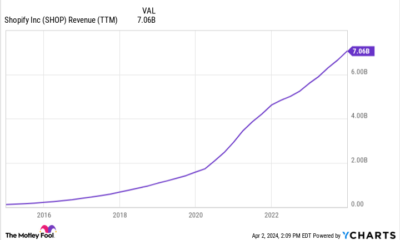SEO
What Is Personal Branding & 4 Reasons Why It’s Important
If you are reading this article, it is almost certain that you have been bombarded with the term personal branding and its relevance in the world of business.
You may think it is some new fad or a figment of the imagination of the marketing gurus.
But, believe it or not, personal branding is here to stay and will only become stronger with time.
So, what is personal branding, and why is it so important? Let’s find out.
What Is Personal Branding?
Personal branding is the process of creating a brand identity for a person or a company. As the name suggests, this is a brand for you or your business.
Essentially, it is how you project your brand and its values to the world and ensure that your target audience knows who you are, what you stand for, and why it’s worth choosing you over your competitors.
Personal branding is not just about marketing but about being your marketer. It is about standing for yourself and your business to command respect and confidence from your peers and customers.
The word “branding” can have a negative connotation when used in the context of businesses.
However, applying the correct principles and strategies will help you create a brand identity for your business and help you stand out from your competition.

Why Is Personal Branding Important?
In an era where people’s attention spans are getting shorter by the minute, the need to make an impression is more important than ever. And the best way to do this is by creating a solid and memorable brand identity.
Unfortunately, most business owners do not realize the importance of personal branding because they think it’s a lot of extra work.
However, the truth is that if you want to create a successful business, you must create a successful brand.
People who know you and your business will trust you more and will buy more products and services from you.
4 Reasons For Personal Branding
1. Helps One Stand Out From The Crowd
It is more important than ever to have a strong personal brand in today’s competitive job market.
A personal brand results from what others think and say about you when you’re not in the room. It is your reputation, and it can make or break your career.
So, why is personal branding so important?
For starters, it helps you stand out from the crowd.
In a world where everyone has a degree, employers are looking for candidates with something extra that makes them unique.
By developing a solid personal brand, you can make yourself the one they remember.
In addition, personal branding can help you command a higher salary.
There are many ways to develop a personal brand, but it starts with knowing who you are and what you want to be known for.
By taking the time to define your brand, you can set yourself up for success in your career and beyond.
2. Leads To Opportunity
We live in a competitive world where everyone vies for the same jobs, clients, and opportunities.
To stand out from the crowd, it’s essential to have a strong personal brand.
A personal brand is the unique combination of skills and experiences that make you who you are. It’s what makes you unique and sets you apart from everyone else.
By developing a personal brand, you’re giving yourself a competitive advantage.
People will remember you and your brand when they look for someone with your particular skills and expertise.
In addition, a strong personal brand can lead to new opportunities. When people see that you’re an expert in your field, they’ll be more likely to give you opportunities to collaborate or work on new projects.
So, if you’re looking to get ahead, start by working on your brand.
3. Your Audience Will Trust You More
Personal branding is the process of creating an identity for yourself as an individual or business. This involves developing a well-defined and consistent look, message, and presence online and offline.
There are many psychology-based reasons why you might want to work on your personal brand.
For one thing, it can help you build trust with your audience.
When people feel like they know who you are and what you stand for, they’re more likely to trust you. That’s because they feel like they have a relationship with you.
They know what to expect from you and that you’re an authority in your field.
Personal branding can also help you stand out from the crowd. In a world where everyone tries to get noticed, having a strong personal brand can make all the difference.
Finally, personal branding can help you attract opportunities.
When employers or clients see you have a strong personal brand, they’ll be more likely to consider you for their next project or job opening.
So, if you’re looking to build trust, attract opportunities, or stand out from the crowd, personal branding could be the answer.
4. People Will Always Screen You Online
-
 Screenshot by author, April 2022
Screenshot by author, April 2022
In the digital age, personal branding has become increasingly important.
With social media and Google, it’s easy for anyone to find out information about you with just a few clicks. As a result, it’s essential to be aware of how you are presented online.
Personal branding can help you control the narrative about yourself and introduce yourself in the best light possible. It’s also a way to stand out from the competition.
In a world where everyone has a website and an online presence, personal branding can help you make yours stand out from the rest.
Personal branding can also help you build trust with potential customers and clients.
If they can see that you’re an expert in your field and have a solid personal brand, they’ll be more likely to do business with you.
Therefore, personal branding is essential for anyone who wants to succeed in today’s digital world.
How To Get Started Developing Your Brand
One good place to start is by cleaning up your social media accounts. You can control what your reputation is online, and so you don’t want anything you post on social media to negatively impact your presence.
Another positive place to begin would be to create a personal website.
Use your website not only to build your brand but to add value to your audience. This is your platform to showcase your skills and experience, and also to share valuable advice with your audience.
Create a logo and theme for yourself, and keep it consistent throughout all your social media profiles.
Define who your audience is and devise a content strategy with them in mind.
Publish compelling content that will draw in your audience and keep them coming back for more because your content adds value to their lives.
Consider creating specialized, personal content that you can give your audience in exchange for their email address; this is a great way to build your email list.
Final Words
A business is nothing without a personal brand behind it.
However, this does not mean you must forsake your business for your brand. Instead, it would be best to have a clear and purposeful strategy for the two.
Personal branding can only be successful if backed by a strong business strategy.
If your plan is weak, your brand is already defeated before it has even begun.
When you integrate your business and personal brands, you have a powerful branding combination that can help you reach your goals faster and easier.
More Resources:
Featured Image: Roman Samborskyi/Shutterstock
!function(f,b,e,v,n,t,s)
{if(f.fbq)return;n=f.fbq=function(){n.callMethod?
n.callMethod.apply(n,arguments):n.queue.push(arguments)};
if(!f._fbq)f._fbq=n;n.push=n;n.loaded=!0;n.version=’2.0′;
n.queue=[];t=b.createElement(e);t.async=!0;
t.src=v;s=b.getElementsByTagName(e)[0];
s.parentNode.insertBefore(t,s)}(window,document,’script’,
‘https://connect.facebook.net/en_US/fbevents.js’);
if( typeof sopp !== “undefined” && sopp === ‘yes’ ){
fbq(‘dataProcessingOptions’, [‘LDU’], 1, 1000);
}else{
fbq(‘dataProcessingOptions’, []);
}
fbq(‘init’, ‘1321385257908563’);
fbq(‘track’, ‘PageView’);
fbq(‘trackSingle’, ‘1321385257908563’, ‘ViewContent’, {
content_name: ‘what-is-personal-branding-why-important’,
content_category: ‘careers-education strategy-digital’
});
SEO
Google Declares It The “Gemini Era” As Revenue Grows 15%

Alphabet Inc., Google’s parent company, announced its first quarter 2024 financial results today.
While Google reported double-digit growth in key revenue areas, the focus was on its AI developments, dubbed the “Gemini era” by CEO Sundar Pichai.
The Numbers: 15% Revenue Growth, Operating Margins Expand
Alphabet reported Q1 revenues of $80.5 billion, a 15% increase year-over-year, exceeding Wall Street’s projections.
Net income was $23.7 billion, with diluted earnings per share of $1.89. Operating margins expanded to 32%, up from 25% in the prior year.
Ruth Porat, Alphabet’s President and CFO, stated:
“Our strong financial results reflect revenue strength across the company and ongoing efforts to durably reengineer our cost base.”
Google’s core advertising units, such as Search and YouTube, drove growth. Google advertising revenues hit $61.7 billion for the quarter.
The Cloud division also maintained momentum, with revenues of $9.6 billion, up 28% year-over-year.
Pichai highlighted that YouTube and Cloud are expected to exit 2024 at a combined $100 billion annual revenue run rate.
Generative AI Integration in Search
Google experimented with AI-powered features in Search Labs before recently introducing AI overviews into the main search results page.
Regarding the gradual rollout, Pichai states:
“We are being measured in how we do this, focusing on areas where gen AI can improve the Search experience, while also prioritizing traffic to websites and merchants.”
Pichai reports that Google’s generative AI features have answered over a billion queries already:
“We’ve already served billions of queries with our generative AI features. It’s enabling people to access new information, to ask questions in new ways, and to ask more complex questions.”
Google reports increased Search usage and user satisfaction among those interacting with the new AI overview results.
The company also highlighted its “Circle to Search” feature on Android, which allows users to circle objects on their screen or in videos to get instant AI-powered answers via Google Lens.
Reorganizing For The “Gemini Era”
As part of the AI roadmap, Alphabet is consolidating all teams building AI models under the Google DeepMind umbrella.
Pichai revealed that, through hardware and software improvements, the company has reduced machine costs associated with its generative AI search results by 80% over the past year.
He states:
“Our data centers are some of the most high-performing, secure, reliable and efficient in the world. We’ve developed new AI models and algorithms that are more than one hundred times more efficient than they were 18 months ago.
How Will Google Make Money With AI?
Alphabet sees opportunities to monetize AI through its advertising products, Cloud offerings, and subscription services.
Google is integrating Gemini into ad products like Performance Max. The company’s Cloud division is bringing “the best of Google AI” to enterprise customers worldwide.
Google One, the company’s subscription service, surpassed 100 million paid subscribers in Q1 and introduced a new premium plan featuring advanced generative AI capabilities powered by Gemini models.
Future Outlook
Pichai outlined six key advantages positioning Alphabet to lead the “next wave of AI innovation”:
- Research leadership in AI breakthroughs like the multimodal Gemini model
- Robust AI infrastructure and custom TPU chips
- Integrating generative AI into Search to enhance the user experience
- A global product footprint reaching billions
- Streamlined teams and improved execution velocity
- Multiple revenue streams to monetize AI through advertising and cloud
With upcoming events like Google I/O and Google Marketing Live, the company is expected to share further updates on its AI initiatives and product roadmap.
Featured Image: Sergei Elagin/Shutterstock
SEO
brightonSEO Live Blog

Hello everyone. It’s April again, so I’m back in Brighton for another two days of Being the introvert I am, my idea of fun isn’t hanging around our booth all day explaining we’ve run out of t-shirts (seriously, you need to be fast if you want swag!). So I decided to do something useful and live-blog the event instead.
Follow below for talk takeaways and (very) mildly humorous commentary. sun, sea, and SEO!
SEO
Google Further Postpones Third-Party Cookie Deprecation In Chrome

Google has again delayed its plan to phase out third-party cookies in the Chrome web browser. The latest postponement comes after ongoing challenges in reconciling feedback from industry stakeholders and regulators.
The announcement was made in Google and the UK’s Competition and Markets Authority (CMA) joint quarterly report on the Privacy Sandbox initiative, scheduled for release on April 26.
Chrome’s Third-Party Cookie Phaseout Pushed To 2025
Google states it “will not complete third-party cookie deprecation during the second half of Q4” this year as planned.
Instead, the tech giant aims to begin deprecating third-party cookies in Chrome “starting early next year,” assuming an agreement can be reached with the CMA and the UK’s Information Commissioner’s Office (ICO).
The statement reads:
“We recognize that there are ongoing challenges related to reconciling divergent feedback from the industry, regulators and developers, and will continue to engage closely with the entire ecosystem. It’s also critical that the CMA has sufficient time to review all evidence, including results from industry tests, which the CMA has asked market participants to provide by the end of June.”
Continued Engagement With Regulators
Google reiterated its commitment to “engaging closely with the CMA and ICO” throughout the process and hopes to conclude discussions this year.
This marks the third delay to Google’s plan to deprecate third-party cookies, initially aiming for a Q3 2023 phaseout before pushing it back to late 2024.
The postponements reflect the challenges in transitioning away from cross-site user tracking while balancing privacy and advertiser interests.
Transition Period & Impact
In January, Chrome began restricting third-party cookie access for 1% of users globally. This percentage was expected to gradually increase until 100% of users were covered by Q3 2024.
However, the latest delay gives websites and services more time to migrate away from third-party cookie dependencies through Google’s limited “deprecation trials” program.
The trials offer temporary cookie access extensions until December 27, 2024, for non-advertising use cases that can demonstrate direct user impact and functional breakage.
While easing the transition, the trials have strict eligibility rules. Advertising-related services are ineligible, and origins matching known ad-related domains are rejected.
Google states the program aims to address functional issues rather than relieve general data collection inconveniences.
Publisher & Advertiser Implications
The repeated delays highlight the potential disruption for digital publishers and advertisers relying on third-party cookie tracking.
Industry groups have raised concerns that restricting cross-site tracking could push websites toward more opaque privacy-invasive practices.
However, privacy advocates view the phaseout as crucial in preventing covert user profiling across the web.
With the latest postponement, all parties have more time to prepare for the eventual loss of third-party cookies and adopt Google’s proposed Privacy Sandbox APIs as replacements.
Featured Image: Novikov Aleksey/Shutterstock
-
SEARCHENGINES7 days ago
Daily Search Forum Recap: April 19, 2024
-

 WORDPRESS6 days ago
WORDPRESS6 days ago13 Best HubSpot Alternatives for 2024 (Free + Paid)
-

 MARKETING6 days ago
MARKETING6 days agoBattling for Attention in the 2024 Election Year Media Frenzy
-

 WORDPRESS6 days ago
WORDPRESS6 days ago7 Best WooCommerce Points and Rewards Plugins (Free & Paid)
-

 MARKETING5 days ago
MARKETING5 days agoAdvertising in local markets: A playbook for success
-

 SEO6 days ago
SEO6 days agoGoogle Answers Whether Having Two Sites Affects Rankings
-

 SEARCHENGINES5 days ago
SEARCHENGINES5 days agoGoogle Core Update Flux, AdSense Ad Intent, California Link Tax & More
-

 AFFILIATE MARKETING6 days ago
AFFILIATE MARKETING6 days agoGrab Microsoft Project Professional 2021 for $20 During This Flash Sale















You must be logged in to post a comment Login